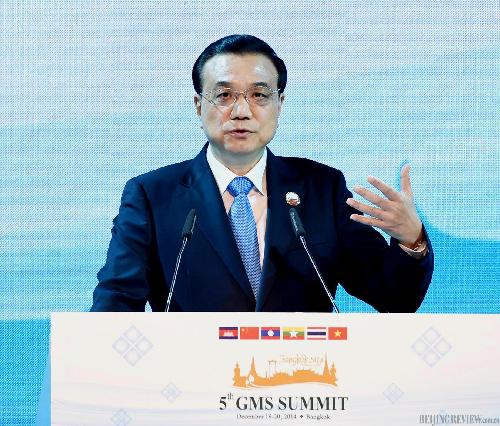|
 |
|
CALLING FOR COOPERATION: Chinese Premier Li Keqiang delivers a speech at the opening ceremony of the Fifth Summit of the Greater Mekong Sub-region Economic Cooperation in Bangkok, Thailand, on December 20, 2014 (RAO AIMIN) |
A significant China-Thailand railway cooperation deal recently signed during the Fifth Summit of the Greater Mekong Sub-region (GMS) Economic Cooperation put the sub-regional cooperation platform on the map. The GMS Economic Cooperation Program, which was launched in 1992 by six countries along the Mekong River—Cambodia, China, Laos, Myanmar, Thailand and Viet Nam, is aimed at pooling joint efforts to improve regional infrastructure, thereby enhancing trade, investment and economic growth. Though previously not a widely known mechanism, the program is becoming a model that China utilizes to promote its good-neighborly policy.
The China-Thailand railway cooperation deal, which has been met with setbacks due to administration alterations in Thailand, will help better connect countries within the GMS. While attending the GMS summit in Bangkok on December 20, 2014, Chinese Premier Li Keqiang praised the deal as the expansion, extension and further confirmation of the previous agreement that the Chinese and Thai governments reached in 2013.
With the deal, China and Thailand agreed to jointly build Thailand's first standard-gauge railway lines with a total length of more than 800 km. The project is estimated to cost around $10.6 billion and will connect northeast Thailand's Nong Khai Province, Bangkok and eastern Rayong Province.
Li also voiced hopes that the cost-effective new railway lines can be extended to other GMS neighbors.
Observers believe that the railway deal and China's new aid proposal go far beyond promoting multilateral interconnectivity and also represent a vast opportunity for GMS countries' development while partnering with the fast-growing China.
Accessing rapid growth
GMS is serving as the land bridge between China and Southeast Asia as well as China and South Asia. All GMS nations are developing countries striving to readjust their industrial structure and open to the outside world, but poor transportation infrastructure and the lack of interconnectivity have been a bottleneck hindering their economic development. Following the concrete achievements made for infrastructure connectivity between China and its GMS neighbors, regional cooperation and integration will be continuously deepened.
The railway lines will contribute to the rapidly growing regional economy, said Lei Zhuning, Deputy Director of the Southeast Asia Research Institute under the Yunnan Provincial Academy of Social Sciences.
"With the continuous improvement of regional transportation facilities, the pace for building a GMS economic corridor will be further sped up. Regional exchanges at government and non-government levels in the GMS have been quite popular these years, so the new lines, once connected, will further bolster that fervor," Lei noted.
Song Qingrun, a research fellow of Southeast Asian studies with the China Institutes of Contemporary International Relations, said that like an artery, the planned Thailand railway will pump the economic development of the country's southern and northern regions as well as push forward GMS regional integration. For instance, the Nong Khai Province could become a gateway for transporting Thai products to China and elsewhere in the world, as well as an attraction for tourists from Laos.
The new lines in Thailand, likely to be connected with the railway linking China and Laos in the future, form a key project of the Trans-Asian Railway and will help build a fast transportation network within the GMS.
They will not only help attract more Chinese tourists to the region to boost tourism along the routes, but also bolster logistics in the region, bringing more investment in GMS countries and forming bigger markets as a result, Song said.
There are strong voices in academic circles of GMS countries calling for a greater role of China in the economic development of the region, especially in terms of infrastructure construction.
In an interview with Xinhua News Agency, Professor Tang Zhimin, Director of China ASEAN Studies of the Bangkok-based Panyapiwat Institute of Management, said that as profitable as they are, GMS projects like the east-west and north-south economic corridors have not yet fully met the needs of this sub-region because of the lack of infrastructure. "China has always been an active participant in GMS initiatives. In the future, we expect it to grow into a responsible leader in the mechanism," he added.
| 